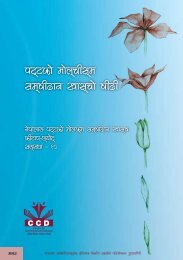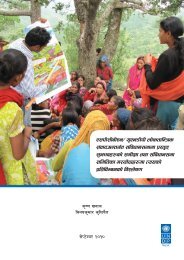The Dalits of Nepal and a New Constitution - ConstitutionNet
The Dalits of Nepal and a New Constitution - ConstitutionNet
The Dalits of Nepal and a New Constitution - ConstitutionNet
You also want an ePaper? Increase the reach of your titles
YUMPU automatically turns print PDFs into web optimized ePapers that Google loves.
62<br />
<strong>The</strong> <strong>Dalits</strong> <strong>of</strong> <strong>Nepal</strong> <strong>and</strong><br />
a <strong>New</strong> <strong>Constitution</strong><br />
Citizenship according to Surname <strong>of</strong> the<br />
<strong>Dalits</strong> :<br />
Public interest litigation was filed against the practice <strong>of</strong><br />
issuing citizenship to <strong>Dalits</strong> according to their respective<br />
pr<strong>of</strong>essions, <strong>and</strong> not according to their surnames. This<br />
has led to discriminatory practices which prevent the <strong>Dalits</strong><br />
from seeking other pr<strong>of</strong>essions, seeking place <strong>of</strong><br />
residence as tenants <strong>and</strong> has contributed to various forms<br />
<strong>of</strong> social exclusion.<br />
<strong>The</strong> Court held that this practice <strong>of</strong> issuing citizenship to the<br />
<strong>Dalits</strong> on the basis <strong>of</strong> their pr<strong>of</strong>ession <strong>and</strong> not their surnames<br />
was clearly discriminatory as they were not treated like<br />
other citizens <strong>of</strong> the country.<br />
<strong>The</strong> Court directed the Government<br />
• to ensure that citizenship is given to <strong>Dalits</strong> according<br />
to their respective surnames <strong>and</strong> not on the basis <strong>of</strong><br />
their pr<strong>of</strong>ession.<br />
• to correct the citizenship <strong>of</strong> the <strong>Dalits</strong> according to<br />
their surnames, treating them equally with other<br />
citizens in every respect.<br />
Case: DNF vs. Office <strong>of</strong> Prime Minister <strong>and</strong> Council <strong>of</strong> Ministers,<br />
Writ No: 3021/061, Decided on 15 May 2006.<br />
Child with no known father entitled to be<br />
assumed to be <strong>Nepal</strong>i<br />
<strong>The</strong> children <strong>of</strong> Badi women who are compelled by their<br />
caste status to work as prostitutes (as indeed <strong>of</strong> other<br />
prostitutes) <strong>of</strong>ten find themselves in difficulty in claiming<br />
their citizenship certificates because their father are<br />
unknown. This was so especially under the 1990 <strong>Constitution</strong><br />
which passed citizenship through the father only.<br />
<strong>The</strong> Supreme Court ruled that such children were entitled<br />
to citizenship under Article 9(2) <strong>of</strong> the constitution which<br />
said that “Every child who is found within the kingdom<br />
<strong>of</strong> <strong>Nepal</strong> <strong>and</strong> the whereabouts <strong>of</strong> whose parents are not<br />
known shall, until the father <strong>of</strong> the child is traced, be<br />
deemed to be a citizen <strong>of</strong> <strong>Nepal</strong> by descent”.<br />
Case: Tek Tamrakar for Pro-Public vs. Cabinet Secretariat,<br />
HMG/<strong>Nepal</strong>, Writ No: 121/060, Decided on September<br />
15, 2005.<br />
No entry to <strong>Dalits</strong> in Sanskrit Hostel :<br />
A PIL action was filed against the criteria for eligibility to<br />
stay in Tindhara Sanskrit hostel as students. According to<br />
the rules <strong>of</strong> the university hostel one needed to have<br />
performed bartab<strong>and</strong>ha (which is performed only by the<br />
higher castes <strong>and</strong> not by <strong>Dalits</strong>) to enter the hostel, among<br />
other requirements.<br />
<strong>The</strong> Supreme Court held that this criterion for entering the<br />
hostel was clearly against the right to equality under article<br />
11 <strong>of</strong> the <strong>Constitution</strong>.<br />
<strong>The</strong> Court directed the university only to adopt criteria for<br />
entering the hostel that did not violate the right to equality<br />
under the <strong>Constitution</strong> <strong>of</strong> <strong>Nepal</strong>.<br />
Case: Dil Bahadur Bishwakarma vs. HMG/<strong>Nepal</strong> <strong>and</strong> Council<br />
<strong>of</strong> Ministry, Writ No: 44/062, Decided on 19 January 2006.<br />
''Muluki Ain could not limit <strong>Constitution</strong> <strong>and</strong><br />
narrow meaning <strong>of</strong> “discrimination''<br />
<strong>The</strong> Muluki Ain (National Code) <strong>of</strong> 1963 provided for the<br />
punishment <strong>of</strong> people who committed acts <strong>of</strong> discrimination<br />
on the basis <strong>of</strong> “untouchability”. But an “Explanation”<br />
attached to this provisions said that practices that were<br />
traditional in temples <strong>and</strong> public places were not<br />
“discrimination”.<br />
<strong>The</strong> Supreme Court held that this “Explanation” was contrary<br />
to the <strong>Constitution</strong> Article 11(4), <strong>and</strong> it was not justified by<br />
Article 19(2) <strong>of</strong> the 1990 <strong>Constitution</strong> about the rights <strong>of</strong><br />
religious denominations, <strong>and</strong> that the “Explanation” was<br />
legally <strong>of</strong> no effect.<br />
Case: Man Bahadur Biswakarma vs. HMG/<strong>Nepal</strong>, NKP 2049,<br />
Vol. 12, p. 1010. 66<br />
<strong>The</strong> reader <strong>of</strong> these summaries may get the impression<br />
that the Supreme Court has made a great contribution to<br />
the rights <strong>of</strong> <strong>Dalits</strong>. But there is a serious problem in<br />
implementation <strong>of</strong> Court orders; this applies not just to<br />
cases involving <strong>Dalits</strong>, but all sorts <strong>of</strong> cases protecting rights.<br />
<strong>The</strong> National Judicial Academy carried out a study <strong>of</strong><br />
implementation <strong>of</strong> Supreme Curt orders <strong>and</strong> the conclusions<br />
were not encouraging.<br />
Explanations for the failures to implement directives are<br />
many including:<br />
• Orders not being made widely available<br />
• Absence <strong>of</strong> any department in <strong>of</strong>fice <strong>of</strong> Attorney-<br />
General to deal with such directives<br />
• Absence <strong>of</strong> any implementation mechanism at the<br />
<strong>of</strong>fice <strong>of</strong> the Prime Minister<br />
• Lack <strong>of</strong> awareness on part <strong>of</strong> government about<br />
directives. 67<br />
66<br />
See Ram Krishna Timalsena, Some L<strong>and</strong>mark Decisions <strong>of</strong> the Supreme Court <strong>of</strong> <strong>Nepal</strong> (Kathm<strong>and</strong>u: Supreme Court, 2003) at p. 223.<br />
67<br />
Taken from INSEC, Human Rights Yearbook 2008 (English Edition) (Kathm<strong>and</strong>u: INSEC, 2008), at p. 76-7.


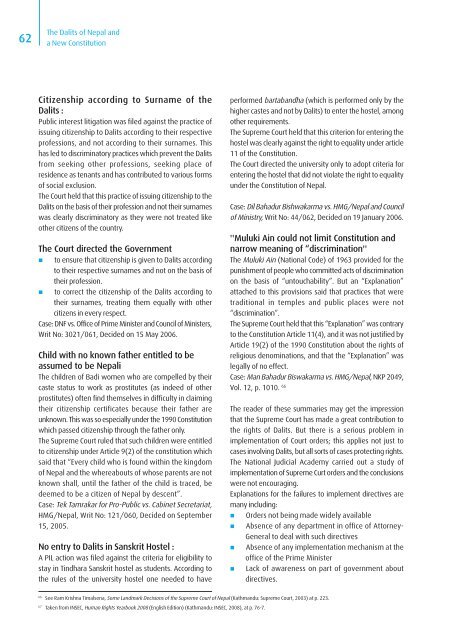

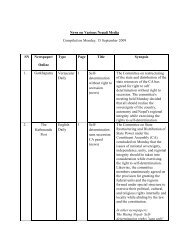

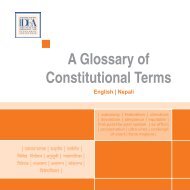
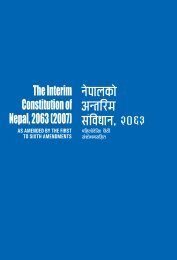
![g]k fnsf blntx? / gofF ;+l jwfg](https://img.yumpu.com/49483602/1/184x260/gk-fnsf-blntx-goff-l-jwfg.jpg?quality=85)
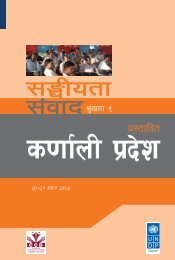
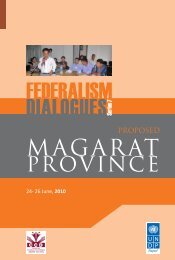
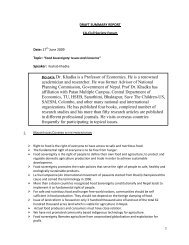
![+ljwfg;ef, /fHosf]k'g](https://img.yumpu.com/41604075/1/184x260/-ljwfgef-fhosfkg.jpg?quality=85)
